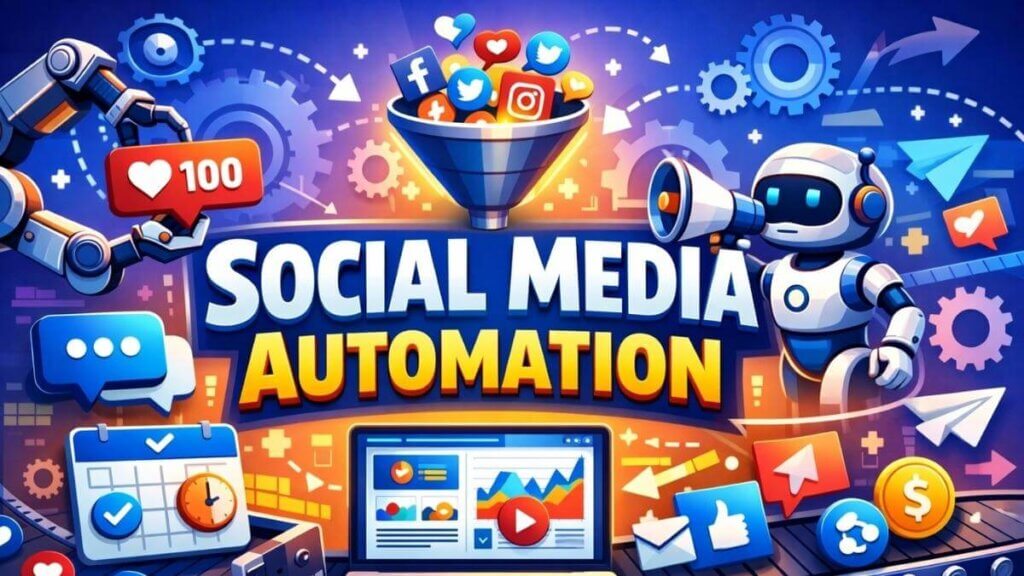Artificial intelligence has reshaped how brands communicate, create, and connect with audiences. Social media has evolved into a sophisticated ecosystem that demands constant innovation, data-driven precision, and creative agility.
AI bridges these demands by enabling marketers to generate content, analyse performance, automate repetitive tasks, and predict audience behaviour. This integration not only enhances efficiency but also magnifies engagement and brand presence.
Understanding how to strategically apply AI can turn your social media marketing into a measurable growth engine.
Role of AI in Social Media Marketing
Artificial intelligence functions as the analytical and creative core of modern social media strategies. It processes vast quantities of user data, identifies behavioural patterns, and produces insights that guide decision-making. Instead of relying on assumptions or manual observations, AI allows marketers to understand what their audience wants, when they are most active, and how they respond to content.
Machine learning algorithms, predictive analytics, and natural language processing underpin these capabilities. They help marketers identify trending topics, recommend optimal posting times, and tailor content that resonates emotionally. This scientific approach to creativity ensures each post serves a defined purpose rather than a random experiment.
Generating Engaging Content with AI Tools
Content creation at a regular pace stands as a major hurdle that marketers need to overcome. The AI tools ChatGPT, Jasper, and Copy.ai help users generate content through the creation of brand-aligned copy, captions and hashtags. The systems identify language patterns from successful posts to suggest proven content structures that help users achieve better engagement results.
AI video-generation tools like InVideo and Lumen5 are useful to generate brief videos that suit particular social media platforms through the transformation of blog content. The design tool Canva AI enables users to produce professional-looking graphics through its fast creation process, which generates results within minutes for every post. AI technology provides the main advantage of rapid and consistent operations because it achieves quick results while maintaining quality standards that human creators find difficult to match when working under tight deadlines.
However, human oversight remains essential. AI systems generate innovative concepts, but marketers need to provide genuine emotional details that result from their knowledge of their audience’s cultural background and personal preferences.
Enhancing Personalisation and Audience Targeting
Personalisation distinguishes memorable campaigns from forgettable ones. AI systems perform their best when they analyse user demographics and interests, and track engagement history and sentiment analysis from comments. The information enables marketers to classify their target groups, which helps them develop marketing strategies based on particular motivational elements.
AI systems use predictive analytics to determine which users will watch videos, but some users show interest in carousel content and interactive poll features. The system delivers content recommendations through two methods, which generate customised headlines and product deals based on the user’s internet activity. The personal touch creates a better click-through rate, which establishes a deeper bond between the brand and its viewers.
The advanced targeting tools Meta Advantage+ and Google Performance Max use AI technology to automatically modify their bidding strategies and display settings for optimum user engagement. The system achieves better advertising return on investment and higher campaign performance through its automated system, which eliminates the need for manual control.
Automating Routine Social Media Tasks
AI’s automation potential is one of its most practical benefits. Scheduling posts, responding to basic queries, and tracking engagement can consume significant time. AI-powered platforms like Hootsuite, Buffer, and Sprout Social integrate automation features that manage these repetitive processes seamlessly.

Chatbots enhance this further by handling initial customer interactions on platforms such as Facebook Messenger, Instagram Direct, or WhatsApp Business. These virtual assistants can respond to product questions, process basic requests, and direct complex enquiries to human agents. This combination of efficiency and accessibility strengthens brand responsiveness while maintaining a personal touch.
Automation also extends to moderation. AI tools detect spam comments, inappropriate language, or negative sentiment, allowing brands to preserve a healthy and respectful online community.
Also Read: How to Save Time Managing Social Media Platforms
Leveraging Predictive Analytics for Smarter Decisions
AI transforms raw data into actionable intelligence through predictive analytics. By examining historical engagement metrics, it forecasts future trends, helping marketers allocate budgets and creative resources more effectively. For example, predictive tools can estimate which type of post—tutorial, testimonial, or product showcase is most likely to succeed next month based on past interactions.
Platforms like HubSpot and Sprinklr use predictive insights to measure how campaigns will perform across various social networks. They identify the optimal content mix, timing, and budget distribution to maximise impact. This data-driven foresight minimises guesswork and enables marketers to respond proactively rather than reactively.
Improving Creative Testing and Performance Optimisation
Traditional A/B testing involves publishing multiple post variations and manually comparing results. AI accelerates this process by automatically generating and testing different creative versions in real time. It evaluates which combinations of text, imagery, and tone drive higher engagement and continuously adjusts campaign parameters accordingly.
AI also enhances content optimisation. For example, systems can recommend adjustments to image contrast, word length, or headline structure to align with the platform’s algorithmic preferences. This granular optimisation ensures that posts achieve both human appeal and algorithmic compatibility, improving organic reach.
Strengthening Brand Voice with AI Insights
One risk of automation is losing a brand’s unique voice. However, AI can actually reinforce consistency when used thoughtfully. Natural language processing models analyse tone, sentiment, and phrasing across all outgoing messages, ensuring the brand maintains a uniform style across platforms.
Sentiment analysis tools monitor audience reactions in real time, flagging potential issues before they escalate. This continuous feedback loop allows brands to adapt their communication style, ensuring their tone remains empathetic, inclusive, and contextually appropriate. In highly competitive spaces, tone consistency and responsiveness contribute significantly to brand trust.
The Future of AI in Social Media Marketing
AI’s role in social media will expand from assistance to orchestration. Within a few years, marketers will use AI to manage entire campaign lifecycles—from idea generation and asset creation to scheduling, analysis, and optimisation. Advances in generative video, synthetic voices, and real-time audience sentiment tracking will make campaigns more interactive and personalised.
Brands that adapt early will gain a measurable advantage. As algorithms learn from performance data, their recommendations will become more precise, guiding marketers towards strategies that consistently outperform manual methods. However, the competitive edge will still depend on human creativity—the emotional intelligence that machines cannot replicate.
Conclusion
Artificial intelligence has become the backbone of modern social media marketing. It amplifies creativity, improves targeting, accelerates production, and transforms decision-making into a precise science. By integrating AI across every stage—from ideation to analytics—marketers can elevate efficiency without compromising authenticity.
The balance between automation and human creativity defines long-term success. When used strategically, AI does not replace marketers; it empowers them to focus on what matters most—creating meaningful connections and delivering value through every post, comment, and campaign.
